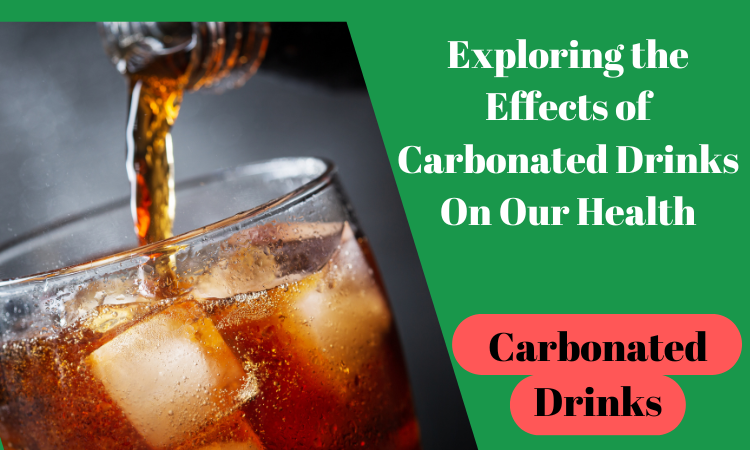Table of Contents
Carbonated drinks, sometimes referred to as fizzy drinks, are made by infusing carbon dioxide gas under pressure, which gives the drink a sparkling effect when it’s consumed. These fizzy beverages are available in cola, lemon-lime, and fruity blends, among other flavors. Despite the fact that it’s widely appreciated, it’s important to recognize the possible health risks associated with excessive intake. Come along as we explore the history, science, and effects of carbonated drinks that are a bubbly beverage delight to all.
The Possible Effects of Artificial Sweeteners

Artificial sweeteners have generated interest and anxiety among those who are concerned about their health because they are thought to be a healthier substitute for traditional sugar. Although they offer a sugar-free choice for individuals trying to reduce their calorie intake, there is disagreement on their possible effects. Artificial sweeteners may have negative consequences on gut health, metabolism, and even weight control, according to a growing body of study. Furthermore, there may be a connection between elevated hunger and possible blood sugar alteration, according to certain research. While further research is required, it is advisable to use artificial sweeteners sparingly and speak with medical professionals to determine any possible effects they may have on a person’s health.
Calorie Burn:
Interestingly, some research indicates that cold drinks may, albeit little, increase calorie expenditure. Warming the cold beverage to body temperature requires energy expenditure from the body, which may lead to a small increase in metabolic activity.
The Effects of Carbonated Soft Drinks on Hydration

If you like to quench your thirst with carbonated soft drinks, you should be aware of their dehydrating effects. Despite their seeming refreshing quality, these carbonated drinks have the potential to cause dehydration over time. How does something like this occur?
Due to their diuretic qualities, carbonated soft drinks encourage the body to produce more urine, which eventually causes fluid loss. These drinks’ high sugar content can also worsen the dehydration effects because sugar needs more fluids to be digested and metabolized.
This is due, in part, to the fact that cold beverages have the potential to narrow our blood vessels. Our body responds to cold beverages by rerouting blood flow from the extremities to the interior organs for protection. This may prevent our cells from absorbing fluids, which would make it more difficult for our bodies to stay hydrated.
Moreover, cold beverages frequently have significant sugar or caffeine content, both of which have diuretic effects. These compounds accelerate the body’s loss of fluid and encourage the generation of urine. Therefore, even while these sweetened or caffeine-infused cold drinks could make you feel better momentarily, they can eventually lead to dehydration.
In order to maintain the highest level of hydration, it is recommended that beverages be consumed at room temperature or slightly chilled. The greatest option for staying hydrated is always water, but if you like flavored drinks, you might want to try adding some fruits or herbs to your water to give it a novel and refreshing taste.
Remind yourself that maintaining general health and wellbeing requires drinking enough of water. Therefore, the next time you’re thirsty, consider your options carefully before reaching for that refreshing beverage and select instead for something hydrating that will actually meet your body’s demands.
The Bitter Truth: How Your Oral Health May Be Affected by Cold Drinks

Many of us find relief from the rising temperatures in a cool, refreshing beverage. But have you ever given any thought to the possible effects these frosty treats could have on your teeth? We’ll talk about cold drinks and their effects on teeth and oral health in this blog area. Now, pour yourself a glass of water (not too cold!), and let’s investigate the startling reality.
The Dilemma of Sensitivity
Tooth sensitivity is one of the main problems that cold drinks can bring on. A quick, acute pain may occur as a result of the rapid shock of cold liquid against your teeth, exposing the dentin behind the enamel. Long-term exposure to cold drinks may intensify this sensitivity, making it difficult for people who are impacted to enjoy chilly drinks.
Tooth Decay: A Chilly Enigma
Cold beverages can make tooth decay more likely, particularly if they are acidic or include a lot of sugar. These elements have the potential to erode tooth enamel, increasing its vulnerability to cavities and demineralization. Acidic and sugary drinks should be avoided as much as possible because they are bad for your teeth and your general health.
Preventive Actions
The good news is that you don’t have to give up cold beverages completely. You can minimize the possible impact by taking precautionary actions. First off, since a straw lessens direct tooth contact, think about using one while drinking cold beverages. Your teeth will also remain strong and healthy if you follow a regular oral hygiene regimen that includes brushing, flossing, and dental exams.
Even though cold beverages might offer a little reprieve from the intense heat, it’s important to understand the possible effects they may have on our teeth. We can achieve a balance between enjoyment and oral health by being aware of the problems associated with tooth sensitivity and erosion and taking preventive action. Keep in mind that moderation is essential—your smile will appreciate it! Remain composed and knowledgeable.
The Unknown Cause of Weight Gain: Carbonated Drinks
We frequently neglect to consider our beverage options when trying to control our weight. We monitor the number of calories in our meals with great care, but what about the fizzy drinks we drink? Unexpectedly, these fizzy treats can significantly affect our waist sizes.
Despite their appealing fizz and sweet flavor, carbonated beverages are frequently high in empty calories. Because of their high sugar content, carbonated beverages like soda, energy drinks, and even sparkling water can cause weight gain. These beverages’ sweeteners, which include artificial sugars and high fructose corn syrup, can cause overindulgence in calories without offering any nutritional benefits.
Furthermore, because carbonated drinks stimulate appetite, they may also negatively affect our weight. These carbonated drinks may make us feel satisfied for a short while, but they might also make us want more food. It may be more difficult to resist indulging in more snacks or larger meals when fizzy drinks promote the production of ghrelin, a hormone that increases appetite.
Making wise beverage selections is crucial to preserving a healthy weight. To satisfy our thirst without consuming extra calories, we can choose low-calorie options like flavored water or unsweetened tea. Making better decisions and ensuring that our favorite fizzy drinks don’t covertly undermine our weight-loss attempts require awareness. Let’s reconsider our drinking preferences and give healthier, more proportionate options top priority.
Carbonated Drinks’ Effect on Mental Health
It’s no secret that a lot of individuals all around the world now consume carbonated drinks on a daily basis. Most people might not be aware, though, that these carbonated drinks can have a big effect on our mental health. We’ll delve into the ways that carbonated drinks impact our mental health in this blog section and discuss the importance of consuming them with awareness.
The Swings in Mood and the Sugar Rush

The high sugar content in carbonated drinks causes blood sugar levels to spike quickly, giving rise to an initial energy rush, sometimes known as a “sugar rush.” Sadly, there’s always a crash that leaves us feeling even more exhausted, agitated, and moody than before. Studies have indicated a robust correlation between elevated consumption of sugar and psychological disorders like anxiety and depression. It is possible to help stabilize our blood sugar levels and encourage a more balanced mood by limiting our intake of carbonated drinks.
Caffeine and Nervousness
Caffeine is another common ingredient in carbonated drinks. It is a stimulant with well-known effects on the central nervous system. While moderate caffeine use might temporarily increase alertness and focus, excessive caffeine use can cause restlessness, anxiety, and even panic attacks in those who are sensitive to it. It can be wise to restrict your consumption of caffeinated carbonated drinks if you have been diagnosed with an anxiety disorder or find yourself prone to anxiety.
Even though indulging in fizzy drinks once in a while might not be bad for us, we still need to be aware of the possible effects on our mental health. Making the switch to healthier options like homemade fruit-infused drinks, herbal teas, or water can make a big difference in improving our general health in little ways. Recall that maintaining a healthy and balanced lifestyle ultimately comes down to feeding our bodies and minds from the inside out.
The Carbonated Drink Revolution: Revealing Their Unmatched Market Domination

Ever ponder why carbonated beverages, like soda and sparkling water, appear to hold a firm hold on the beverage industry? It appears as though they have established a distinct domain within the sphere of consumer inclinations. Let’s examine the causes of carbonated drinks’ unparalleled market dominance in this blog segment.
Their broad appeal is one of the main reasons they have conquered the market. With their array of tastes and refreshing bubbles, sodas have firmly established themselves in our culture. Their constant presence in our society is seen in everything from soda fountains in vintage cafes to soda vending machines on every corner.
The clever marketing techniques used by producers of carbonated drinks are another factor. These businesses consistently run focused advertising efforts, deftly appealing to the needs and ambitions of their target audience. Through skillful association of their products with moments of celebration, pleasure, or leisure, they have successfully forged irresistible emotional bonds.
Convenience is another important consideration. Carbonated beverages are widely available, as they can be found in almost any supermarket, petrol station, and dining establishment thanks to an extensive distribution network. When combined with their reasonably priced and appealing packaging, they have established themselves as a constant presence, easily quenching our everyday thirst.
Carbonated beverages’ broad appeal, potent marketing techniques, and easy accessibility have solidified their leadership in the market. Even though they might control the market, it’s crucial that customers understand the possible health hazards connected to excessive consumption. Therefore, the next time you reach for that carbonated beverage, remember to do so sparingly and think about looking into healthier options.
Conclusion:
There is more to know about the health effects of carbonated soft drinks than just their sugar content. People can choose their beverages wisely by learning about the potential risks, dehydration effects, dental health issues, difficulties managing their weight, and possible mental health issues. In the end, it is critical to approach our well-being holistically, taking into account the long-term impacts of the food we eat on our physical and mental health.





